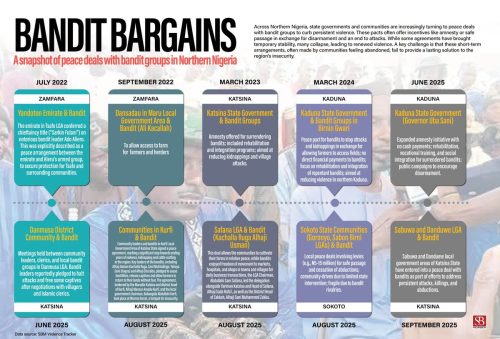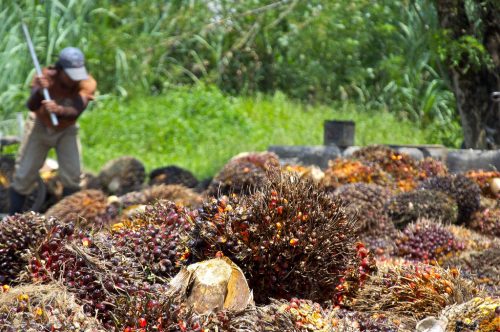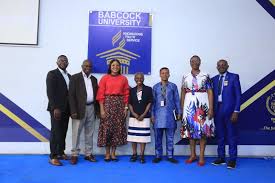Northern states turn to peace deals as bandit violence persists

State governments and communities across northern Nigeria are increasingly striking peace deals with bandit groups as a means to curb persistent violence, according to data compiled by SBM Intelligence.
The arrangements, which often include amnesty, rehabilitation, and safe passage, are designed to reduce attacks and kidnappings that have plagued the region for over a decade.
However, many of the pacts have struggled to produce lasting peace, frequently collapsing after short-term calm.
In Zamfara State, one of the first widely reported deals came in July 2022, when the Yandoton Emirate in Tsafe Local Government Area conferred a chieftaincy title, Sarkin Fulani, on notorious bandit leader Ado Alerio.
The move was described as a peace gesture intended to secure protection for Tsafe and surrounding communities.
Two months later, another agreement was reached in Dansadau, Maru Local Government Area, with the group led by Ali Kacallah to allow farmers and herders safe access to farmlands.

By March 2023, Katsina State launched a formal amnesty programme for bandits who surrendered their weapons.
The initiative promised rehabilitation, reintegration, and skills training in exchange for peace, targeting a reduction in kidnappings and village attacks.
Kaduna State adopted a similar approach in March 2024, negotiating with bandit groups in Birnin Gwari.
The government offered farming access and rehabilitation support while rejecting direct financial payments.
The focus, officials said, was on reintegration and reduction of violence. In June 2025, Governor Uba Sani expanded the initiative to include vocational training, social integration, and community-based disarmament campaigns.
Peace bargains have also spread to local communities across the region. In Katsina, village leaders in Kurfi and Safana LGAs entered deals with armed groups in August 2025 to allow farming and trade in exchange for the cessation of attacks.
Sokoto State communities in Goronyo and Sabon Birni LGAs also reached pacts reportedly involving levies of up to ₦5 million for safe passage and an end to abductions.
In September 2025, Sabuwa and Dandume LGAs of Katsina became the latest to engage in local peace deals as part of efforts to tackle repeated kidnappings and killings.
Despite these efforts, analysts warn that many of the agreements lack structure and accountability.
While authorities argue that the peace pacts are necessary stop-gap measures, critics say they risk legitimising criminality and weakening state authority.
For many rural communities, however, dialogue remains the only path to temporary stability amid a conflict that shows no sign of abating.










